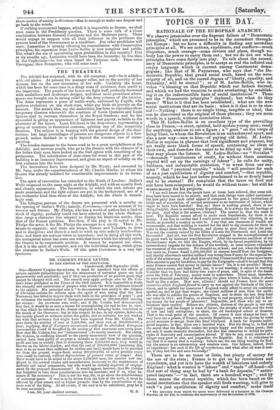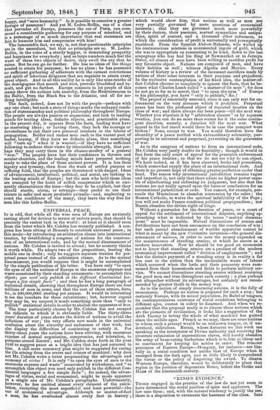TOPICS OF THE DAY.
RATIONALE OF THE EUROPEAN ANARCHY.
WE observe jeremiades over the flagrant failure of "Democratic principles," which are presumed to be in the ascendant through-
out Europe : but we have a difficulty in finding any ascendant principles at all. We see notions, expedients, and conflicts—much eloquence, much courage—some devices and plans, though no- body has the power to carry them out ; but we do not see what principles have come fairly into play. To talk about the ascend- ancy of Democratic principles, is to accept as real the inflated and
empty language which is current among Continental dema- gogues ; like that of M. Puyraveau' who says that " the De- mocratic Republic, that grand social truth, based on the sove- reignty of all, and on the sacred dogma of liberty, equality, and fraternity,' will be eternal " ; or of M. Ledru-Rollin, who in.
yokes " a blessing on that Republic which our fathers decreed, and which we had the vocation to make everlasting, by establish-
ing it on the indestructible basis of social institutions. '4 These are the " Democratic principles " deplored ; but what do they mean ? What is it that has been established ; what are the new social institutions that are its basis ' • what is it that is to be eter- nal ?—Nothing : there is no single thing, tangible or ideal, that can be discovered as the original of those phrases ; they are mere words in a speech, without correlative ideas.
This M. Ledru,Rollin is an excellent type of the prevailing class in France,—a stout, spirited, bold-spoken young man ; ready for anything, anxious to cut a figure ; a " gent " on the verge of being blasé, to whom the Revolution is an unhackneyed sport, and also a new way—new to him—of paying old debts. M. Ledru- Rollin is copious in phrases that look significant and piquant, but are really mere blank forms of speech, containing no ideas of their own, and therefore the easier to be filled up with any ideas that may please the listener. M. Ledru-Rollin—no " Socialist" —demands "institutions of credit, for without them usurious capital will eat up the earnings of labour " ; he calls for unity, boldness and indomitable resolution, "to wrest from our ene- mies " that " practical republic" which "will produce for each of us a just equilibrium of dignity and comfort,"—that republic, namely, which he has just before proclaimed to be so firmly based and to be eternal ! He complains that the taxes on food and salt have been reimposed ; he would do without taxes : but still he wants money for his projects.
"I am well aware that the people have at times been relieved, that some mil- lions have been tossed to its misery, and that such things were called assistance: but how petty does such relief appear if compared to the grand institutions of credit and of association, of mutual assistance as an instrument of labour, which ought to have been founded ! But, no! there is nothing grand; there is no- thing fruitful; there is nothing truly Republican. It is always the old leavings of the past. And what is the answer, citizens? The answer is, that the state is poor. The Republic cannot afford to make such foundations, for there is no money. I am tree to confess that I could never understand this objection in so fertile, so powerful a country as ours is. I say that our resources of wealth are innumerable, and that nothing is wanted but the skill to dig channels for them in order to direct them to the Treasury, and thence to pour them out to the poor. Was not the country ruined by the follies of Louis the Fourteenth and Louis the Sixteenth ? And yet, was the first Revolution stopped in the accomplishment of its great work by monetary considerations? After the enormous sacrifices of our Revolutionary wars, we had the Empire, which, by its forced requisitions, by its extraordinary imposts for the defence of the territory, in some manner exhausted the resources of the country. We thought so, at least; and yet, when the Restora- tion came on, France found 1,500,000,000 to ransom herself from the foreigners, and shortly afterwards another milliard was wrung from France for the especial be- nefit of the aristocracy. And shall it be said that France could find sums to an incre- dible amount to pay for her defeat, to pay for the Emigrants—shall it be said that this same France cannot find money to sustain labour? No, it is not possible! Money creeps into corners, and hides itself; but, it is not wanting; it cannot be wanting. Consider that we have had thirty-two years of peace, and, in spite of the losses since the 24th of February, money most be somewhere. There must, therefore, be some financial possibility of discovering the place where it hides, when it shuts itself up like a miser. How now, citizens should not France have the same resources which England found to carry on war against the blockade of the Con- tinent, and to uphold her commerce? England could afford to array six coalitions against us, and to pay their wages; she raised ,millions of men from the earth; she was able to subdue the genius of Napoleon, and to drain the last drop from our veins in 1815: and France, so abounding in real property, should fail in find- ing money for her people of labourers! Impossible, and those who say so ca- lumniate their country. Believe me, citizens, distress of the people is our only real danger; and the danger is want of labour, the atrophy of trade, and the want of new and bold enterprises; in short, the old hackneyed school of finances. That is the weak point of the question. Of course it may change its face; it may turn out a poison, if France, sincerely Republican, wants the genius by some grand measure to escape from this fatal whirlpool A bank for deposits antici- pated imposts; in fact, there are a hundred ways. But the thing is, to find out the secret that the Republic makes the people happy and the nation great; that not only it meets domestic discomfort, but also has resources to defend its prin- ciples of fraternity: anti emancipation abroad. If this be not, every shadow of a danger may grow in size, and jeopardize the Republic. But it is ridiculous to say that it is money that is wanting: believe me, the one thing wanting for find- ing the money is an enterprising and resolute man. Our fathers, indeed, lived on expedients: bat such Is the life of revolutions; and what after all does it mat- ter, if they but live and save humantly?"
There are to be no taxes or little, but plenty of money for the use of the state ; France is to get on by revolutions and expedients, and yet is to have the wealth of laborious and orderly England : what is wanted is "labour" and " trade " off-hand—all that sort of thing may be had by "a bank for deposits," "antici- pated imposts "— in fact, there are a hundred ways" ; and by those means the eternal republic, which has been based on the social institutions that the speaker still finds wanting, will give to each "a just equilibrium of dignity and comfort,' make itself
* The speeches from which we quote were delivered at a banquet In the Champs Elysees, on the 220, to celebrate the anniversary of the Revolution of 1792.
happy, and "save humanity." Is it possible to conceive a greater farrago of nonsense? And yet M. Ledru-Rollin, one of a class that pervades all Europe, possesses the ear of Paris, can com- mand a considerable gathering for any purpose of mischief, and is a personage of so much importance that real statesmen are fain to humour him and compromise with him ! The lamentable fact, we say, is, not that questionable principles are in the ascendant, but that no principles are so. M. Ledru- Rollin, in the voice of a sturdy beggar, is demanding prosperity and happiness for everybody ; and as large numbers much feel the want of those two objects of desire they swell the cry that he raises. But he can go no further. fie has no ideas of the things needed to attain his purposes ; he has no plans; he has possessed no sufficient gathering of adherents with the earnest convictions and spirit of laborious diligence that are requisite to attain every great object. And in all this nullity he is only like nine-tenths of the demagogues that mouth and rant, provoke bloodshed and tu- mult, and get no further. Europe consents to let people of this stamp throw the nations into anarchy, from the Mediterranean to the Baltic from the Black Sea to the Atlantic, and all for no- thing intelligible.
The fault, indeed, does not lie with the people—perhaps with any one class; but such a state of things marks the unhappy condi- tion of statesmanship and political philosophy throughout Europe. The people are always passive or sequacious, and look to leading minds for leading ideas, definite objects, and practicable plans. In the present day, it appears from the facts, leading men have no mastering ideas ; or having them, they lack the courage or devotedness to risk their own personal interests in the labour of propagation. Bolder and rasher men- rush to the vacant post: of leader, hoping, if they have no definite plans, that something will "turn up " when it is wanted,—if they have no sufficient following to enforce their views by irresistible strength, that per- haps they may carry them in the chance-medley of a general "row." The peoples have lost their confidence in thrones and secular churches, and the leading minds have prepared nothing ready to take the place of those ancient powers. It is less from bigotry and tyranny, than from the want of settled purpose or sufficing faith, that the peoples are threatened with danger. Ideas of advancement, intellectual, political, and social, are lurking in the leading minds of Europe ; but the men who hold those ideas are cramped by the habit of selfish compromise which so emi- nently characterizes the time—they fear to be explicit, lest they should startle, alarm, or estrange—they prefer to use their talents in safer and more profitable pursuits—and, neglecting to Court the confidence of the many, they leave the way free for men like this Ledru-Rollin.



























 Previous page
Previous page